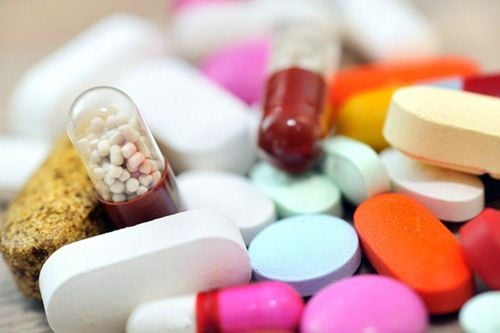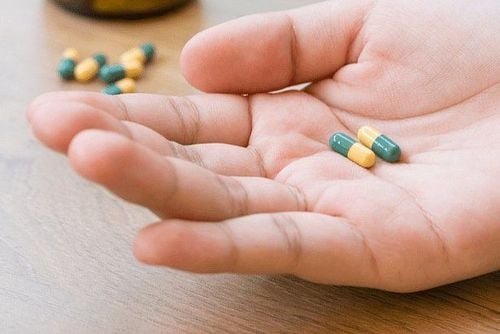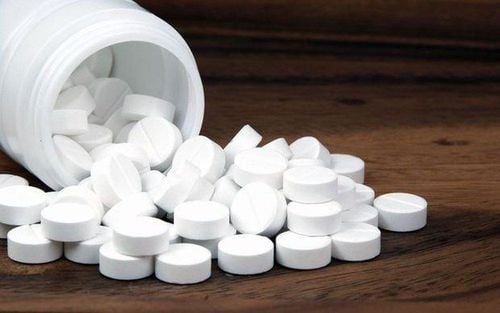This is an automatically translated article.
Cefotan (Cefotetan) is an antibiotic used to treat a variety of bacterial infections. Medicines may also be used before and during certain surgeries to help prevent infection. This medicine is known as a cephalosporin antibiotic.1. How to use Cefotan
Cefotan works by stopping the growth of bacteria, this antibiotic only treats bacterial infections. It will not be effective against viral infections (like the common cold, flu). Using any antibiotic when it is not needed can make it ineffective for future infections.
Read and learn all instructions for preparation and use provided by the manufacturer. Follow all instructions for correct mixing with the correct IV fluids. Before use, inspect the product visually for any drug changes (such as color). If yes, do not use medication.
If you are using a pre-mixed frozen solution, defrost the container at room temperature or in the refrigerator. If the medicine was thawed in the refrigerator, let it stand at room temperature for at least 1 hour before using it. Do not defrost in a water bath or microwave. After thawing, shake the medicine container well and check for any leaks. Discard the solution if the medication container leaks. After the medicine has been defrosted, do not put it in the freezer.
The drug is given by injection into a muscle or vein as directed by your doctor.
To maximize the effect of the drug, it is best to use this antibiotic at spaced times. Take this medicine(s) at the same time each day to avoid missing a dose. Health status and response to treatment are factors that help doctors determine the dose of medicine for each subject.
2. Side effects
Swelling, redness, pain or soreness at the injection site may occur after a patient uses Cefotan. This medicine may also cause loss of appetite, nausea, vomiting, diarrhea, or headache. Tell your doctor right away if the above symptoms do not improve or get worse.
The benefits of the drug outweigh the risk of side effects, so your doctor has prescribed it for you. Therefore, you should not worry too much about the serious side effects caused by the drug.
Contact your doctor right away if you experience serious signs after using Cefotan, including: Dark urine, easy bruising/bleeding, fast/pounding/irregular heartbeat, seizures, weakness unusual weakness, yellow eyes/skin, mental/mood changes (such as confusion).
Cefotan can sometimes cause a serious intestinal condition (clostridium difficile-associated diarrhea) caused by a resistant bacteria. This condition may occur during treatment or weeks to months after stopping treatment. Do not use antidiarrheal or opioid medications if you have any of the following symptoms, as these products can make the condition worse, including: Persistent diarrhea, stomach or abdominal pain/ cramps, blood/mucus in stool.
Long-term or repeated use of Cefotan may lead to new oral thrush or vaginal yeast infections. If you notice the appearance of white patches in your mouth, a change in vaginal discharge, or other new symptoms, you need to contact your doctor right away.
Rarely, a serious allergic reaction caused by Cefotan has occurred. However, call 911 or your local health facility right away if you notice any of the following symptoms: Rash, itching/swelling (especially of the face/tongue/throat), severe dizziness, difficulty breathe.
Here are some of the side effects caused by Cefotan:
Difficulty sleeping Headache Agitation Decreased appetite Difficult or painful urination Dizziness Drowsiness Heart palpitations Skin color Changes Muscle tremors Nausea Anxiety

Cefotan có thể gây tình trạng đau đầu cho người dùng
Rare effects:
A type of skin disorder called acute exocrine pustules Hallucinations High blood pressure Insufficient blood supply to the large intestine Convulsions Shortness of breath Vomiting Changes in vision Abnormal heartbeat Feelings anxiety Drowsiness Dry mouth Excessive sweating Hallucinations Heart pounding or pounding Indigestion Irritation Stomach or intestinal irritation Nightmares Excitement Feeling dizzy Stomach cramps Vomiting
The following conditions are contraindicated with Cefotan. Or tell your doctor if you have any of the following:
Overactive thyroid Diabetes Angle-closure glaucoma High blood pressure Uncontrolled high blood pressure Coronary artery disease Prostate enlargement paralysis Inability to empty the bladder completely Debilitated patient Allergy:
Guaifenesin Analogue Dextromethorphan Ephedrine Analogues Tell your doctor right away if you experience any of the above or other unusual symptoms after taking this medicine. using Cefotan.

Khi dùng Cefotan xuất hiện bất thường, người bệnh nên liên hệ bác sĩ ngay
3. Precautionary measures
Before using cefotetan, tell your doctor if you are allergic to it; or with other cephalosporins; or with penicillin; or any other allergic reaction.
Please provide information about your medical history, especially if you have liver, kidney, stomach/intestinal problems (eg colitis), alcohol use/abuse.
Avoid consuming alcoholic beverages while taking this medicine and for at least 3 days after stopping Cefotan. Drinking alcohol can lead to severe stomach upset, nausea, vomiting, headaches, and flushing.
Cefotetan may make live bacterial vaccines (such as typhoid vaccine) inactive. Do not receive immunizations/vaccinations while using this medication unless directed by your doctor.
As you get older, your kidney function will decline more and more. This drug is eliminated by the kidneys. Therefore, when using Cefotan, older adults may be at greater risk of side effects.
Women who are pregnant and breastfeeding should consult their doctor before taking Cefotan.
4. Interaction
Tell your doctor about all medications you are taking (including prescription, over-the-counter and other products), especially: Aminoglycoside antibiotics (eg Tobramycin , gentamicin), blood thinners (eg Warfarin), chloramphenicol to avoid all possible drug interactions.
This medication may interfere with certain medical tests (e.g., urine blood sugar tests, serum creatinine tests, or urine tests), leading to false test results.
If you feel short of breath or faint from an overdose, call 911 right away. Overdose of Cefotan can cause symptoms such as convulsions, difficulty breathing.
This medicine is only prescribed to treat your current condition. Do not use the medicine for another infection unless directed by your doctor.
Medical tests (e.g. Complete Blood Count) may be performed periodically to monitor your progress or check for side effects.
Take your medicine as soon as you remember if you missed a previous dose. Skip the missed dose if it is almost time for the next dose.
Before mixing, store at room temperature, away from light and moisture. Do not refrigerate or freeze medicine in powder form. Different brands/packaging of Cefotan may have different storage conditions. Read the information on the product label and consult your doctor about the pre- and post-mixing storage requirements for the medication you are taking.
Store the pre-mixed medicine containers in the freezer at -20 degrees Celsius or below. If stored at room temperature, use/discard the thawed solution within 24 hours.
Dispose of medication properly when no longer in use or expired.
Please dial HOTLINE for more information or register for an appointment HERE. Download MyVinmec app to make appointments faster and to manage your bookings easily.
Reference source: webmd.com












